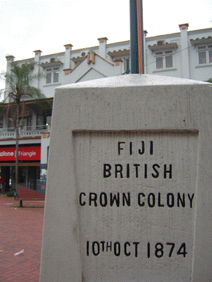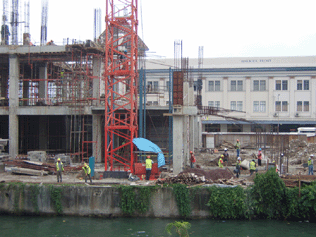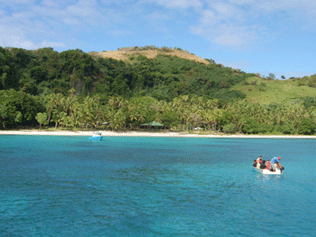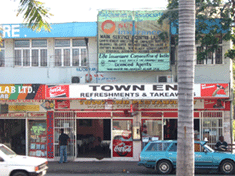 In 1986, then-Pope John Paul described Fiji as "The way the world should be." A few short months later, in May, 1987, Fiji had its first military coup, and a second one followed in September of the same year. A decade later, in 1997, Fijians confirmed their acceptance of a new Constitution, heralded as one of the most progressive in the world, and both Fijians and the international community looked to it as a hopeful structure to support this often troubled democracy.
In 1986, then-Pope John Paul described Fiji as "The way the world should be." A few short months later, in May, 1987, Fiji had its first military coup, and a second one followed in September of the same year. A decade later, in 1997, Fijians confirmed their acceptance of a new Constitution, heralded as one of the most progressive in the world, and both Fijians and the international community looked to it as a hopeful structure to support this often troubled democracy.
In 2000, George Speight, a part-European (1) businessman championing self-interest behind indigenous rights, stole the headlines of Pacific regional news by taking Fiji’s Parliament hostage for 56 days, suspending the Constitution, and implementing a 6:00pm curfew in Fiji’s capital city, Suva (2). General lawlessness resulted in the looting of many shops and homes. This drama ended with Speight’s arrest and an interim government appointed, but the social, political and economic unrest in the wake of these events have set many Fijians on edge (3).
Most recently, the democratically elected government was removed by a bloodless coup on December 5th, 2006. This was Fiji’s fourth non-democratic transition of government in 20 years. Immediately following the 2006 coup, the military dissolved Parliament, and the military commander, Commodore Josaia Voreqe Bainimarama, assumed the title of Prime Minister as well as Minister for Home Affairs, Immigration and Information. Commodore Bainimarama has instituted a wide range of decrees that have sent up red flags of warning to pro-democracy activists and their international supporters.
Pro-Democracy Advocates Targeted
One repercussion of the coup has been the violent suppression of voices critical of the military government. In the last three weeks, at least four democracy advocates have been put on "no fly lists" and denied exit from Fiji. Tupou Vere, the director of the Pacific Concerns Resource Center (PCRC), an anti-nuclear organization which advocates for human rights and decolonization, is one of those who have not been allowed out of the country. A soft-spoken woman who has dedicated her life to justice work, Tupou seems an unlikely threat to commanders who purport to represent increased focus on justice for Fijians. While attempting to travel to Kenya to present a paper at an international conference on HIV/AIDS, she was stopped at the Fiji International Airport customs check and denied exit (4). On July 12th, pro-democracy activist and business woman Laisa Digitaki was stopped from leaving the country, and Francis Herman, a Fijian radio journalist, was scheduled to give the key-note address at a conference in Australia when he was also stopped at the airport.
In essence, these people are on ‘country arrest’ but with no explanation of why or for how long. Incredibly, if you are a Fijian who is planning to travel, for F$12 (roughly US$8), you can check to see if your name is on the no-fly list. Some activists check this list each time they travel, but others do not want to even identify themselves for fear of self-incrimination.
This policy is meant to silence otherwise vocal civil society activists who fear even greater repercussions for exercising their freedom of speech. However, such fear tactics call into question the very democracy that the coup-leaders claimed to be heralding. In recent months, there have been more serious actions taken against pro-democracy advocates. Several people have experienced middle-of-the-night kidnappings by the government for questioning, being stripped of their clothes, and forced running around the military barracks, and even jogging on public roads as a form of humiliation. Activist Angie Heffernan, who was humiliated by the military, has taken her case to court with the assistance of an Australia-based lawyer John Cameron, but Cameron was recently deported (5).
One NGO worker and democracy advocate who prefers to remain unnamed described this situation: "I was working late at the office one night, at around 10:00 pm, when I received a phone call from a friend at another NGO. I was told that the military is targeting NGOs tonight, and that I should be careful. So, I turned off the lights at work and did not go back to my flat.’ Now, I do not work late anymore. There is so much fear, and as you are running from your own home, you have to go somewhere. Wherever I go, I am aware that I am putting the family where I am staying at risk of harassment."
For others, the fear of being picked up by the military is constant: "Sometimes a car passes late at night and I think, ‘this is it, I’m going to be taken by the military.’" People in the US struggle to comprehend this kind of insecurity, this lack of entitlement to personal safety and freedom of expression that exists today in Fiji. That said, the harassment of one’s own citizens sounds reminiscent of the Bush Administration’s treatment of so-called ‘enemy combatants.’
Coups and their Ethnic Undertones

Fiji had been a British colony for almost one hundred years, from 1874 to 1970, at which point it became a member of the Commonwealth. This island nation has a population of under a million people, an ethnic mélange of indigenous Fijians, part-Europeans, and Indo-Fijians, those descended from the South Asian population brought as indentured labor by the British to work the sugar cane crops in the late 1800’s (6). Race is not a private matter in Fiji. To enter the country, Fijians must check the correct racial box on the immigration form, and such racial declarations are a reality when negotiating all government bureaucracies from hospitals, schools, and even voter polls.
Ethnicity is often at the forefront of political power jockeying, although it cannot be separated from the economic realities associated with it. The government has historically funded indigenous Fijian schools more generously than those consisting of Indo-Fijian majorities in an attempt at "affirmative action" to boost lackluster indigenous education performances. The Indo-Fijian community, as heterogeneous as it is, has generally been excluded from land ownership due to native title rights, despite the fact that they constitute the majority of commercial farmers. The fragility of land leases for Indo-Fijians, and the threat to primary governance of their country and its natural resources for indigenous Fijians and those of mixed European and indigenous decent, has led to dramatic feuds over political control in the national arenas (7).
The Reality of Indefinite Interim Government
While the parliament was dissolved immediately after the coup, the Great Council of Chiefs (GCC), a constitutionally created body that has more than 100 years of history in Fiji continued to function until mid-2007 when the Chiefs made recommendations that contradicted the military’s interim government agenda. The GCC has the important role of advising the Prime Minister on the appointment of the President and Vice-President, and also selects some members to the senate (when it is operating, of course) through the provincial traditional councils. However, it was a huge blow to Fiji’s democratic blend of indigenous and westernized institutions when the GCC rejected Commodore Bainimarama’s nomination for vice president in May 2007, and he simply instructed the ‘interim’ minister of Fijian Affairs to disband the GCC.
 Construction continues on the GCC’s new waterfront building in Suva, but it is unclear who, if anyone, will occupy the building when it is completed. Perhaps it will sit idly as the Parliament house has been for the last eight months. When asked who is actually governing Fiji at the moment, one resident told us, "The real cabinet in the country is a small group of senior military officers and past military commanders."
Construction continues on the GCC’s new waterfront building in Suva, but it is unclear who, if anyone, will occupy the building when it is completed. Perhaps it will sit idly as the Parliament house has been for the last eight months. When asked who is actually governing Fiji at the moment, one resident told us, "The real cabinet in the country is a small group of senior military officers and past military commanders."
Despite the fact that the parliament is dissolved and the GCC has been suspended, the ‘interim’ government continues to claim that the constitution is still in effect. But the term ‘interim government’ is a far cry from being universally accepted. This is the term that the coup-leaders chose for themselves, though it has been simply picked up by the Fijian and international media unquestioningly. The current timeline for the handover of power ‘back’ to an elected government puts elections sometime in 2009. This extended interim status of the government is problematic, and some activists prefer to call the military rulers the ‘illegal’ government instead of ‘interim.’
Fiji’s Perilous Economy Post-2006 Coup
 The usually crowded hallway of our ocean-view hotel was empty; listless waiters waited for customers that never come. People ask us, ‘do you feel safe here in Fiji?" We reply truthfully, "of course." Everywhere we go we are greeted with the enthusiastic Fijian welcome: Bula! Strangers introduced themselves on each of the four islands that we had time to visit (out of more than 300 which compose the Fiji Islands).
The usually crowded hallway of our ocean-view hotel was empty; listless waiters waited for customers that never come. People ask us, ‘do you feel safe here in Fiji?" We reply truthfully, "of course." Everywhere we go we are greeted with the enthusiastic Fijian welcome: Bula! Strangers introduced themselves on each of the four islands that we had time to visit (out of more than 300 which compose the Fiji Islands).
People ask about our safety because since Fiji’s coup in December, both the Australian and New Zealand governments have discouraged their citizens from traveling to Fiji. In reality, it is perfectly safe for travelers to move around Fiji’s many tourist locations, but these government announcements are meant to put international political pressure on Fiji’s ‘interim’ military government to restore democratic institutions. While Commodore Bainimarama has not backed down, tourism numbers have declined significantly, and Fiji’s largest money-making industry (surpassing sugar exports as of 2004) is struggling to bring in the foreign currency.
But it is not only tourist money that Fiji has lost because of the coup. Several international donors have pulled bi-lateral support to the government (including Australia and New Zealand), and Fiji has been temporarily suspended from the Commonwealth, entailing a damaging blow to preferential trade relations. New Zealand will now only channel their funds through non-governmental organizations (NGOs), and they have cut off public sector training initiatives (8).
While many donor nations have stated their discontent with Fiji’s coup and ‘interim’ government, New Zealand’s Prime Minister Helen Clark has engaged in a well-publicized verbal spat with Commodore Bainimarama. Clark stated that the Commodore would be treated "like a leper" (9) if he were to attend the Pacific Island Forum scheduled for October 2007. The Commodore has had equally harsh words for Clarke, and attempts to portray her as a bully in the Pacific region. New Zealand has instituted targeted travel sanctions against the Fijian military leaders and their families, which has isolated them internationally.
New Zealand has also cancelled its university scholarships for Fijian citizens. One Fijian student whom we met said, "I was accepted to go to New Zealand on a scholarship for a masters degree in 2007, but because of the coup they took away the funding." Policies like these have wide-ranging effects on the long-term training and capacity of Fiji’s people, but the interim government does not appear to be acquiescing to the pressure. There is also a major brain-drain, because many educated Fijians are moving to Australia to work, and to give their children what they see as a more secure future.
The coup-holders removed the last government under the pretence of needing to get rid of corruption. However, the military seems to have hit the jackpot with its control over government coffers. Usually accustomed to getting cash allocations from the government, the military is now the group making allocations to other parts of the bureaucracy. It remains to be seen whether the leaders will be able to keep their hands out of the money-pot, or whether they will fall into the same trap of corruption as many international democratically elected leaders.
When asked what keeps hope alive for her in the midst of such trying circumstances, Tupou Vere replied that for her, it was a sense of justice. She said, "I have a lot of nieces and nephews and I want to leave them a country that operates fairly. The future you leave behind for the children of the country" Tupou reflects, "is worth hoping for." But the stakes are high in Fiji, and the outcome remains to be seen.
For more information, to donate, or get involved, please visit:
-Pacific Concerns Resource Forum
-Citizens Constitutional Forum
-Pacific Islands Association of NGOs
-FemLink Pacific
References:
(1) This is the term used in Fiji to refer to people of mixed indigenous Fijian and European heritage.
(2) For more detail see Robertson, Robbie and William Sutherland. 2001. Government by the Gun: The Unfinished Business of Fiji’s 2000 Coup. Pluto Press, Australia.
(3) This article results from conversations with several Fijian activists who prefer to remain anonymous for their own safety.
(4) Reported in Fiji Sun, July 3, 2007.
(5) Reported in Fiji Live article, 26 June 2007
(6) For more, see Scarr, Deryck. 1984. Fiji: A Short History. George Allen and Unwin, Sydney, Australia.
(7) For more, see Lal, Brij V. 2006. Islands of Turmoil: Elections and Politics in Fiji. Asia Pacific Press, Australia National University.
(8) NZaid: New Zealand International Aid & Development Agency website, accessed July 22, 2007; http://www.nzaid.govt.nz/programmes/c-fiji.html.
(9) Reported in New Zealand Herald, July 13, 2007.
Mneesha Gellman and Josh Dankoff will both complete their Masters Degrees at the University of Queensland, Australia, in November, 2007. Their interests include conflict resolution, international development, and indigenous epistemologies. Mneesha and Josh traveled to Fiji in July, 2007. They can be contacted at mneesha (at) gmail.com and jadankoff (at) gmail.com
